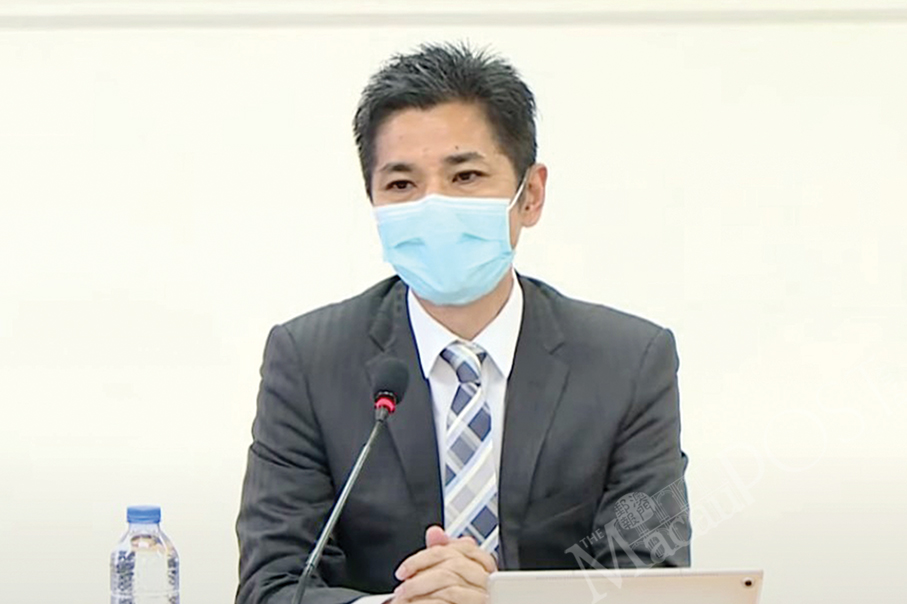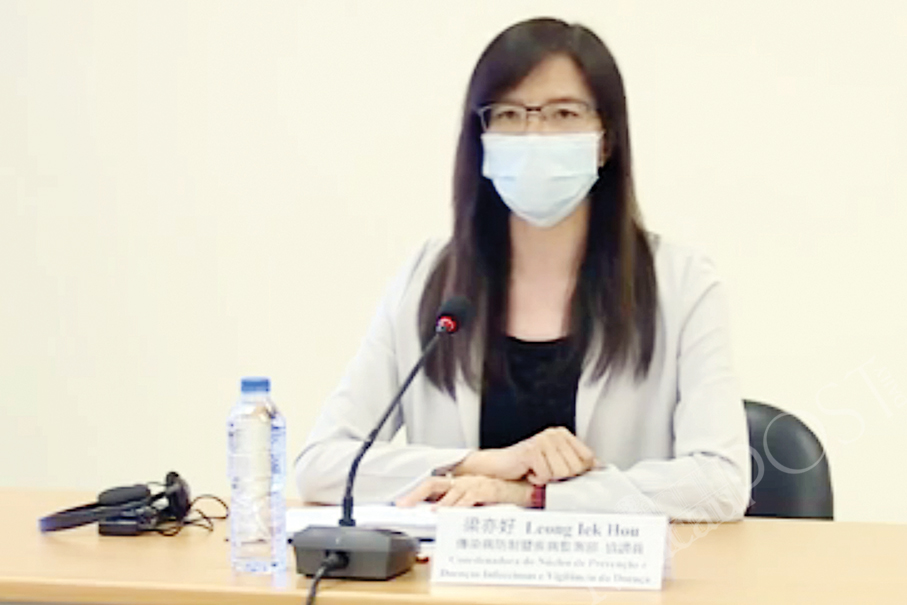Addressing yesterday evening’s press conference about Macau’s novel coronavirus situation, Tai Wa Hou, a clinical director of the public Conde de São Januário Hospital Centre, revealed that an expert team organised by the National Health Commission (NHC) was in Macau for a four-day inspection visit until yesterday, in order to assess the city’s COVID-19 prevention work.
During the inspection visit, Tai said, the expert team acknowledged Macau’s achievements in its COVID-19 prevention and control work. However, Tai said, the expert team urged the local government to carry out more “proactive” measures to boost COVID-19 vaccinations considering the “large” difference in inoculation rates between Macau and the mainland.
Secretary for Social Affairs and Culture Elsie Ao Ieong U first told reporters in July that the local government had asked an expert team from the National Health Commission to visit Macau to examine the city’s COVID-19 prevention work.
During yesterday’s press conference, Tai said that at the invitation of the Macau government an expert team organised by the National Health Commission visited Macau from Monday to yesterday to examine the city’s COVID-19 prevention and control work and give the local government guidance on the matter. During the inspection visit, Tai said, the NHC experts gave local health officials various suggestions on improving the city’s novel coronavirus prevention and control measures, in addition to acknowledging the city’s achievements on the matter.
Tai said that the local government had decided not to invite the media to cover the NHC expert team’s inspection visit as it merely involved “internal” exchanges on technical matters among health officials from both sides. Tai pledged that the local government will announce details about the four-day inspection visit via statements in due course.
“Experts from the National Health Commission have also visited various regions in the mainland to assess their respective COVID-19 prevention work, which have always been carried out as “internal” exchanges. We [the Macau government] did not invite the media to cover the NHC expert team’s inspection visit to Macau, so as to respect their usual practice,” Tai said.
8-member team
According to Tai, the NHC team that visited Macau consisted of eight experts from various fields such as prevention and control of infectious diseases, clinical treatment and laboratory testing. During their four-day visit, Tai said, the NHC experts carried out on-site inspections of Macau’s COVID-19 prevention and control work from different angles. The experts attended seminars organised by the Macau Health Bureau (SSM) “every day” where local health officials briefed them on Macau’s novel coronavirus prevention and control measures, Tai said.
According to Tai, the NHC experts have concluded that the Macau government has been putting very strong emphasis on COVID-19 prevention and control, such as by having set up a coordination mechanism on COVID-19 work which enables the local government to make good use of resources from various public entities. In addition, Tai said, the NHC expert teams have acknowledged that the local government has been constantly improving its COVID-19 measures in various aspects such as entry restrictions and quarantine, medical treatment and nucleic acid testing (NAT).
However, Tai said, the NHC experts have come up with various suggestions on improving Macau’s COVID-19 work, such as strengthening its monitoring and management of certain groups of people who are potentially subject to a higher COVID-19 risk, and improving its awareness campaigns on COVID-19 vaccinations.
Tai added that the NHC experts visited various places related to COVID-19 work during their four-day inspection, such as the Macau checkpoint of the Hong Kong-Zhuhai-Macau Bridge (HZMB), the command centre of the Novel Coronavirus Response and Coordination Centre, a number of “quarantine hotels” and the public Conde de São Januário Hospital Centre, as well as a number of health centres, NAT stations, and COVID-19 vaccination facilities.
Low vaccinate rate ‘adversely affects’ COVID-19 prevention
According to Tai, the NHC experts have pointed out that inoculating against the novel coronavirus is one of the most important measures on COVID-19 prevention and control. The experts also noted the “large” gap in COVID-19 vaccination rates between Macau and the mainland. This, according to Tai, is “adversely affecting” Macau’s COVID-19 prevention and control work.
Tai also noted that the NHC experts have suggested that the Macau government should roll out more “proactive” measures to boost the COVID-19 vaccination rate. In particular, Tai quoted the NHC experts as saying that Macau should launch measures to raise the COVID-19 vaccination rate among certain groups of people who are subject to a higher COVID-19 risk, in line with “the principle of inoculating as many people as possible”.
In addition, Tai said that the NHC experts have also urged the Macau government to study the reasons why certain residents have chosen not to get vaccinated against COVID-19 so that it can come up with accurate measures to render its vaccination campaigns more effective. The experts have also suggested that Macau should boost COVID-19 vaccinations through “community mobilisation”, urging local enterprises to assume their “social responsibility” by pushing their employees to be inoculated.
Tai noted that over two billion doses of COVID-19 vaccines have been administered in mainland China, adding that Macau can learn from the mainland’s multifarious experience in achieving a higher vaccination rate.
As its next step, Tai said, the Macau government will roll out measures to boost COVID-19 vaccinations among certain groups of people in line with “the principle of vaccinating as many people as possible”, such as medical workers, those working on the frontline at the city’s border checkpoints, civil servants and teachers.
‘All residents have the obligation’
Tai underlined that all residents have the responsibility and obligation to be inoculated against COVID-19 to protect themselves from the novel coronavirus, and more importantly, to protect seniors and children living with them.
“Everybody knows that for the time being those aged below 12 are unable to be inoculated, because of which the protection for children relies on vaccinations among adults and teachers, and that’s why they have this responsibility and obligation,” Tai said.
As of 4 p.m. yesterday, 603,152 doses of COVID-19 vaccine had been administered to 327,783 people in Macau, comprising 50,470 who had received their first jab and 277,313 who had received their second jab.
Macau’s COVID-19 vaccination rate stood at 48 percent as of 4 p.m. yesterday – i.e., 48 percent of the population had received at least one jab. According to the latest demographic statistics, Macau’s population stood at 682,500 at the end of June.
A total of 11 adverse events were reported in the past 24 hours (until 4 p.m. yesterday). The total number of adverse events since the start of the vaccination drive stood at 2,557, or 0.42 percent of the total number of jabs, including eight serious cases.
Macau has not recorded a new local COVID-19 case for 30 consecutive days after a Delta variant four-member family cluster was confirmed on August 3.
Macau confirmed the first of its 63 novel coronavirus cases on January 22 last year. No COVID-19 fatalities and no community outbreaks have been reported.

Tai Wa Hou, a clinical director of the public Conde de São Januário Hospital Centre, addresses yesterday’s press conference about the city’s novel coronavirus (COVID-19) situation. Photo: GCS








